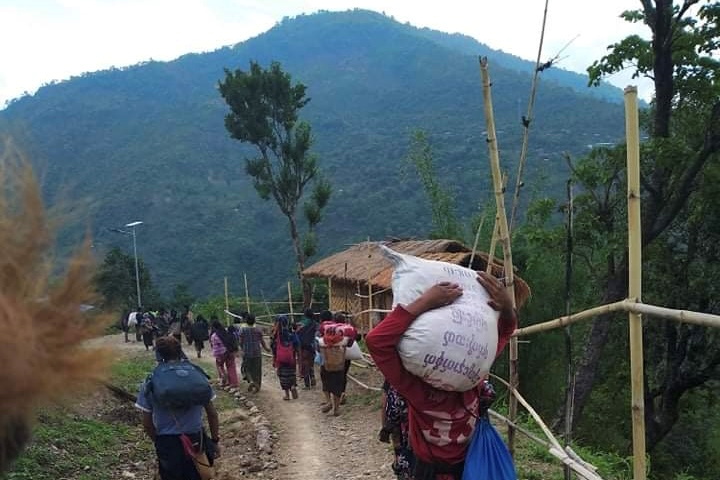|
|
|
After decades of conflict, it is often said that that political struggle in Myanmar has three groupings: military, pro-democracy and ethnic. But, as Cheery Zahau argues in this commentary, the ethnic nationality cause is frequently marginalised and misunderstood. Paradigm shifts in political behaviour and perspectives are required on all sides if the failures of the past are not to be repeated.
These commentaries are intended to contribute to a broader understanding to the many challenges facing the country and its peoples.
See the complete list of all the Myanmar commentaries.
|
|
|
|
 People who fled fighting in northwestern Myanmar’s Chin State carry supplies (Reuters) People who fled fighting in northwestern Myanmar’s Chin State carry supplies (Reuters)
|
|
|
|
|
|
|
| |
| Can we avoid more bloodshed? A reflection on the ethnic crisis in Myanmar |
|
A Commentary by Cheery Zahau
15 June 2021
As a teenage high-school graduate, I fled to India and joined the democracy movement through a Chin women’s organisation based on the India-Myanmar border. My hunger for knowledge in politics led me into the devotion of my whole youth working on human rights and gender equality for my country and my community – the Chin people. As political change began in 2011, I returned to my land immediately and tried my best to contribute to a federal democratic country and a better society.
Today, we are living under military rule again as a result of the coup d’etat on 1 February. This political turmoil leaves us with more chaos and with more violence by both state and non-state actors. The national armed forces, known as the Tatmadaw, have indicated no political will to end the state of confrontation and crisis. Tatmadaw leaders want power and control, clinging on to their philosophy of the guardianship of the nation. Democracy supporters, known as the Spring Revolution, want the removal of the military from politics and the abolition of the 2008 constitution, which enshrines the Tatmadaw’s role and privilege in politics. As a result, any progress in political reform and national reconciliation during the past few years – even if limited – is reverting back to square-one. The country could be following a course towards destruction.
This presents many dilemmas over political choices for Myanmar’s long-suffering peoples. For the Spring Revolution, it is unacceptable to suggest a dialogue at this moment because supporters want to see the military weakened and removed from political life. Offering peace and dialogue to Tatmadaw leaders at such a time is considered to be submitting to military power. I understand this rationale, as the armed forces have shown no hesitation in using violence to suppress demonstrators and its perceived opponents.
At the same time, the removal of the military from national politics is what we – the ethnic peoples – have been struggling for across the decades, whether through political parties, armed resistance or, more recently, a nationwide peace process. Our situation, however, is often misunderstood, and ethnic politics is often regarded as a secondary issue to the challenges of socio-political transition in the country at large.
|
|
|
|
|
|
| |
|
|
|